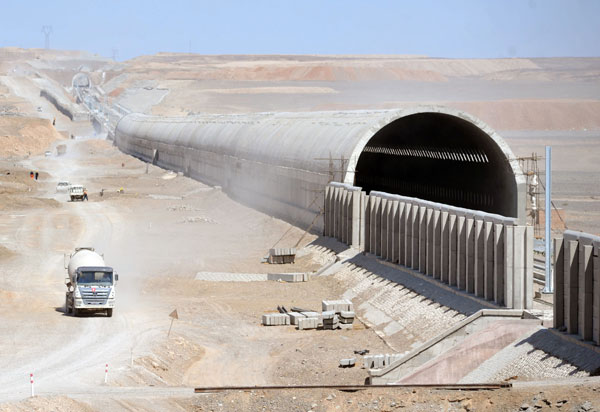Challenging times on 'high-speed Silk Road'
Updated: 2013-07-12 07:38
By Cui Jia (China Daily)
|
|||||||||||
Wind zones
In Xinjiang, strong winds are a major threat to the safety of the high-speed railway, according to Ma Xizhang of the project management department of Xinjiang Lanzhou-Urumqi Railway Co, which is responsible for construction of a 710-km stretch of railway in Xinjiang.
 |
|
China's first windproof railway tunnel, in the Shisanjianfang district of Hami, where the winds are fierce and gales occur on more than 250 days of the year. |
The high-speed railway will pass through three of the region's most-feared areas, where winds traveling at speeds of up to 166 km per hour regularly disrupt operations on the old Lanzhou-Urumqi railway and have even been known to overturn trains.
"The nature of the high-speed railway means the threat posed by the wind is much higher than for a conventional railway, so windproofing projects are crucial to its success," said Ma.
Earlier this week, China's first windproof railway tunnel was completed in the Shisanjianfang district of Hami, where the winds are strongest and gales occur on more than 250 days of the year.
Without citing a specific figure, Ma said the construction costs were high but the 1-km-long tunnel is essential. "When the company's inspection team arrived in the area in 2010, the windows in their cars were smashed by stones carried on the sudden, strong winds. If that happened to a high-speed train, it would be a disaster."
More than 65 percent of the Lanzhou-Urumqi high-speed railway in Xinjiang will cross these wind zones. In addition to the tunnels, windbreaks are also being erected to further ensure the safety of the trains. The scale of windproofing is the largest of all the high-speed railways currently under construction in China.
Related Stories
Xinjiang residents hand in knives and explosives 2013-07-11 17:22
Xinjiang courts urged to fight terrorism 2013-07-09 20:21
Weibo users have grape expectations for Xinjiang county 2013-07-09 07:08
Attacks a blow to Xinjiang tourism 2013-07-09 02:29
Terror law called for after Xinjiang attack 2013-07-09 01:24
Today's Top News
Top GSK executives probed in bribery
Coal mine found concealing blast death toll
A dream home helps build the future
Masks reveal unknown worlds
Shelter to help abandoned children
Lifesaving top priority, premier says
Pathfinder pianist
Villagers excited to meet President Xi
Hot Topics
Lunar probe , China growth forecasts, Emission rules get tougher, China seen through 'colored lens', International board,
Editor's Picks

|

|

|

|

|

|





